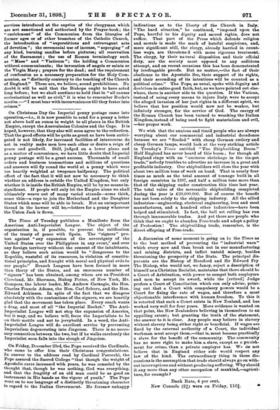A discussion of some moment is going on in the
Times as to the best method of preventing the "industrial wars" which every now and then break out in our manufacturing and mining districts, and inflict untold misery, besides threatening the prosperity of the State. The principal dis- putants are the Bishop of Hereford and Sir Edward Fry. The Bishop, who would not, we fancy, reject a description of himself as a Christian Socialist, maintains that there should be a Court of Arbitration, with power to compel both employers and men to accept its award, while the [retired] Judge prefers a Court of Conciliation which can only advise, point- ing out that a Court with compulsory powers would be a Court for fixing the rate of wages, and therefore a most objectionable interference with human freedom. To this it is retorted that such a Court exists in New Zealand, and has worked very well for four years. More evidence is wanted on that point, the New Zealanders believing in themselves to an appalling extent; but granting the truth of the statement, the answer to it is clear. Any people may believe in slavery without slavery being. either right or beneficial. If wages are fixed by the external authority of a Court, the individual workman must accept them,—that is, must become practically a slave for the benefit of the community. The community has no more right to make him a slave, except as a punish- ment for crime, than a private employer has. We do not believe that in England either side would respect any law of the kind. The extraordinary thing in these dis- cussions is the assumption that trade should always go on with- out interruptions and without producing suffering. Why should it any more than any other occupation of mankind,—agricul- tare, for example ?


































 Previous page
Previous page